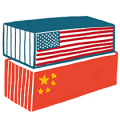

US-China finance relations: quietly flows the Dollar
Despite the last US President’s moves to limit his country’s financial relationship with China, Maximilian Kärnfelt says capital flows between the two nations look set to rise.
The relationship between the US and China has worsened considerably in recent years. The world now speaks about the ‘decoupling’ of the two countries and their reduction of interdependencies. US President Donald Trump’s trade war against China is seen as a prime example of this. It went from being a conflict about tariffs to targeting Chinese tech companies such as Huawei and came to involve the financial markets. But financial relations look set to deepen further despite all that.
Voices in the US had long that warned Chinese citizens and companies could freely use the US financial system – most commercial transactions are subject to tariffs and restrictions, financial ones generally are not. Trump in response delisted Chinese telecoms companies from US stock exchanges, barred some public pension funds from investing in some Chinese companies, required US-listed Chinese companies to follow US accounting rules, imposed financial sanctions on individuals.
But these policies will not accomplish much. Portfolio claims between residents of the two countries are immense and growing. China is more heavily invested in the US than the US in China. A Rhodium Group report estimated that by the end of 2020 US residents had claims on about 1.2 trn USD and Chinese residents on about 2.12 trn USD worth of debt and equity securities. Some 1 trn USD of Chinese portfolio claims on the US are Chinese government holdings of US treasuries.
In addition, many Chinese companies have listed their stock on US exchanges. In 2020, 217 Chinese firms with a total market capitalization of 2.2 trn USD were listed on the NYSE, the tech companies Alibaba and Tencent included. Chinese firms have different objectives when listing there, though most commonly to meet USD financing needs and to secure higher stock-market valuations.
Foreign direct investment (FDI) is also high. In this case, the US has invested more in China in the past 30 years than China in the US. There are many reasons for this – for example, China’s capital controls that deter citizens from buying assets abroad and US investment screening. The US Congressional Research Service puts cumulative FDI since 1990 at 258 bn USD from US and 152 bn from China.
Vast tangle of investments will be difficult for the US government to undo
The US government at present has little control over financial flows from the US to China. Liberal democracies typically only institute limited control over capital outflows, unless the receiving country is an enemy (like North Korea). Controls are rare and usually limited because they impinge upon property rights of citizens and companies. Trump was only able to take minor steps in defiance of this precedent – and any further ones would likely spark resistance from business and politics.
On the other hand, the US has much more power to limit Chinese investment in the US – it can, for example, prohibit Chinese banks buying shares on US exchanges. Restrictions on investments by foreigners have many precedents – they were the norm in the West until quite recently and remain the norm in China. But any US steps on this front would come at a great cost, as the ramifications of doing so would be immense. This has so far kept the US government from large-scale action.
Firstly, the provocation for China would be so major that it could opt for the ultimate financial retaliation – selling its holdings of US treasuries. This would shake the US financial system and potentially cause a financial crisis. If the US Federal Reserve wanted to prevent that, it would have to buy the treasuries. This would almost certainly result more inflation and depreciation of the US dollar. This, in turn, would reduce the US’s external purchasing power and make many Americans poorer.
Secondly, constant financial flows into the US clearly benefit parts of the economy. More liquidity helps reduce financing costs, and asset prices are boosted by net flows into stock and property markets. If these flows were to stop, a chain reaction of losses would not be out of the question. Even if there was no chain reaction, falling returns would hurt many, including pension savers.
Some in the US want limits to financial relationship, China and investors do not
China has sought to integrate itself into the global financial system by opening up to foreign investors and by allowing foreign financial institutions to establish fully owned ventures within its borders. Inbound capital helps growth, market discipline, exchange rate management and the yuan’s global popularity. The Stock and Bond Connect programs allow investors in Hong Kong to trade on the mainland without restrictions, and Chinese investors to trade in Hong Kong, though with some limits.
These and other programs have quickly become popular. The Hong Kong, Shanghai and Shenzhen Stock Connect programs turned over a total 18 trn CNY in 2020, almost twice as much as in 2019. The Bond Connect program now counts 2400 investors and turned over 588 bn RMB in January alone. Debt and equity issuers on all these markets are happy for foreign investors to contribute capital. And Chinese investors are happy they can now legally diversify into foreign financial products.
US investors are also eager to increase their investments in China as they have long underweighted Chinese securities. Furthermore, Chinese economic growth is outperforming global growth, which generally results in higher investment returns. The IMF forecasts Chinese economic growth will hit 8.1 percent in 2021 – and world growth 5.5%. This should lead to greater capital inflows into China.
China and investors want to see deepening financial ties between the US and China. Parts of the US government might want to resist, but are essentially powerless because the short-term consequences of seriously trying to limit the relationship would be severe. Unless China oversteps red lines drawn by the US – for example by acting militarily outside its own borders – any profound change to financial relations is unlikely any time soon. They are more likely to deepen and grow.
This is an abridged English version of the article "Il ‘decoupling’ finanziario non e all'orizzonte," published in the journal Aspenia 92 in March 2021.
